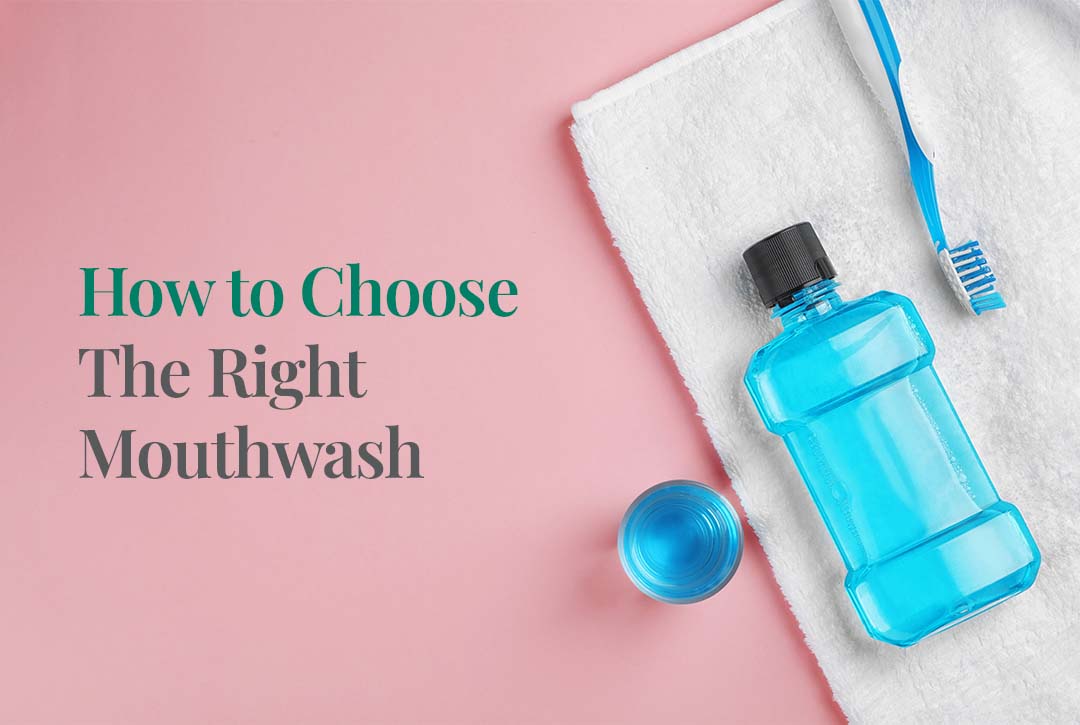How to Choose the Right Mouthwash?

Many of us often include mouthwash (also known as mouth rinse) as part of our oral care regimen, aside from regular brushing and flossing. While not strictly necessary, a mouthwash plays a vital role in improving and maintaining our oral health. It can act as an oral bactericide to prevent cavities and reduce the risks of gum disease.
With so many types of mouthwash on the market, how do you choose one that suits you the most? Read on to find out more.
Types of Mouthwashes
There are no one-size-fits-all mouthwashes, as different formulas are created for various purposes. Whatever your oral care needs are, you can choose one that suits your preference based on practical or aesthetic reasons.
Antiseptic Mouthwash
This is one of the most common mouthwashes that often contains Chlorhexidine gluconate. Combined with regular brushing and flossing, an antiseptic mouthwash can effectively kill plaque bacteria that cause halitosis (bad breath) and certain mouth infections. However, prolonged use of this mouthwash may result in teeth staining, and should be avoided for long-term use unless advised by a professional.
Fluoride Mouthwash
A fluoride mouthwash is formulated to prevent tooth decay and strengthen tooth enamel. However, be cautious with fluoride usage as fluoride can also be found in toothpastes and tap water. Ingesting too much fluoride may cause adverse effects to your body.
Teeth Whitening Mouthwash
Like any regular mouthwash, a teeth whitening mouthwash can help kill germs and fight tooth decay. Hydrogen peroxide, an ingredient commonly found in whitening mouthwash, has the added benefit of reducing teeth stains, treating mouth ulcers, and soothing sore throats. However, hydrogen peroxide can be harmful when swallowed, so bear in mind to keep it away from young children.
Natural Mouthwash
If you suffer from tooth sensitivity or are prone to mouth irritation, look out for mouthwash that contains natural ingredients such as sea salt, tea tree oil, or baking soda. This type of mouthwash is typically free of alcohol, fluoride, and artificial flavours, and yet function the same as other regular mouthwashes. Like with any regular mouthwash, take a closer look at its constituents to learn more about its effectiveness.
Cosmetic Mouthwash
As the name suggests, a cosmetic mouthwash serves aesthetic purposes by masking bad breath temporarily. It is not formulated to offer the same protection as other mouthwashes that help fight tooth decay.
Is Alcohol-based Mouthwash Better?
You will probably notice two distinct categories of mouthwashes on the market – alcohol and alcohol-free.
Alcohol-based Mouthwash
Ethanol found in alcohol-based mouthwash has antibacterial properties of killing germs and bacteria effectively in the mouth, which reduces the risks of cavities and gingivitis. An alcohol-based mouthwash may also give off the impression that it has better efficacy due to its powerful burning sensation.
However, it can aggravate those with existing oral irritations and impede the healing of mouth ulcers. The harshness of ethanol, especially in high concentrations, can inhibit saliva production and result in mouth dryness over time.
Some studies have also shown that regular use of alcohol-based mouthwash may also increase the risk of developing oral cancer, although there is insufficient evidence to prove this at the moment.
Alcohol-free Mouthwash
If you suffer from burning mouth syndrome or are unaccustomed to that sensation caused by alcohol-based mouthwash, an alcohol-free mouthwash may be more suitable. It is generally safer and beneficial to those with sensitive teeth and gums. Using an alcohol-free mouthwash can also help prevent dry mouth and an imbalance of good and bad bacteria in your mouth.
Furthermore, an alcohol-free mouthwash is safer for dental fillings and restorations without compromising their colour, wear, and hardness.
Whether you wish to improve oral health or whiten your teeth, it is important to find the right mouthwash that suits your oral care needs. However, do note that using a mouthwash is not a remedy for oral problems. Speak with a dentist about your dental concerns, and remember to schedule regular dental check-ups to keep your oral health in check.
This article is written by:
Dr Nora Heng, Specialist in Periodontics and Consultant, Raffles Dental















